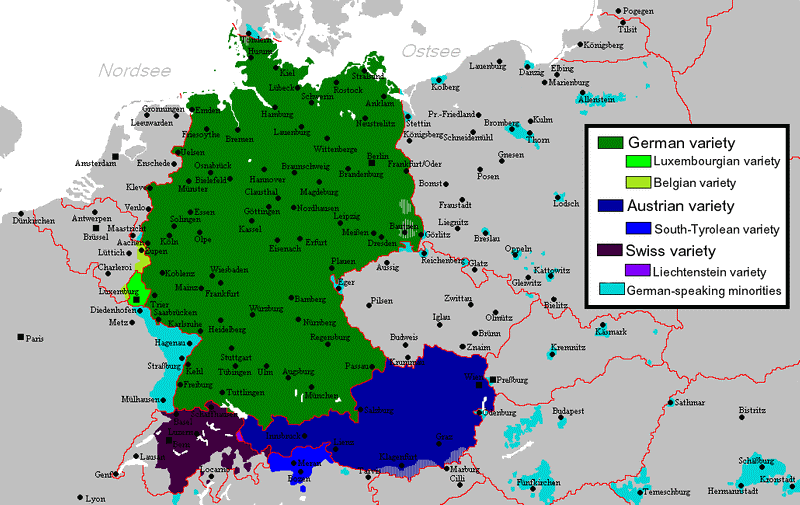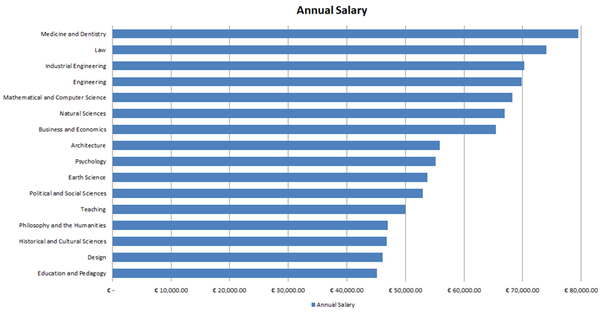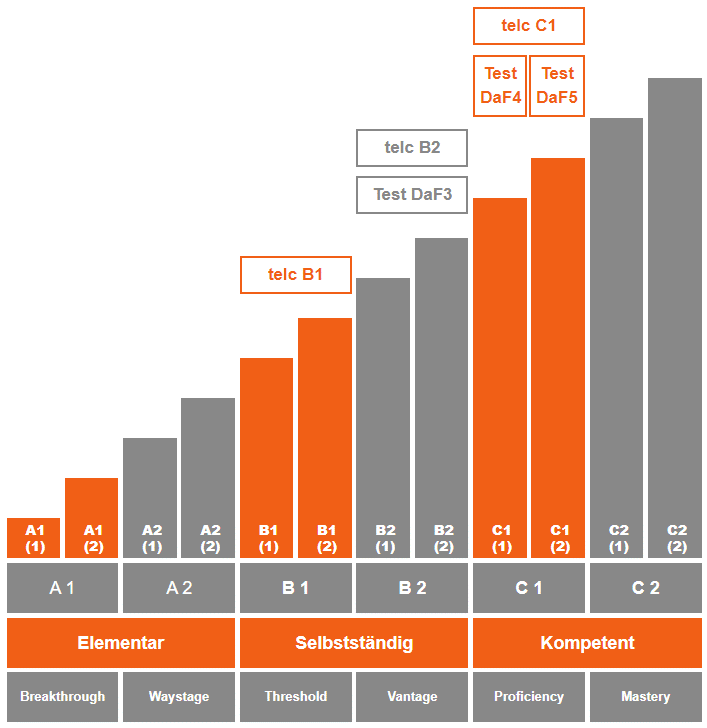

How does the German language rank in international comparison?
Concerning the number of native speakers, it's quite far behind and ranks number 10. There are approximately 104 million native German speakers. But more important for an international ranking is the gross national product (GNP) that is yielded by German speakers. And in that regard, the German language is in fourth place. So you could say that the economic potential associated with native German speakers holds a lot of weight.
The number of German language learners is considerable. Here, German also ranks fourth. Only English, French and Chinese rank higher than German and Spanish. The further east you go, the more important German becomes. Even in China or India, German is more important than, say, Spanish.
Why do people decide to learn German these days? Because Germany is an economically strong and "sexy" country?
1. German is most widely spoken native language in Europe
German (Deutsch) is the most widely spoken mother tongue in Europe.
Germany is not the only country where it is spoken. It is the official language of Germany, Austria, Switzerland, Liechtenstein, Belgium, and Luxembourg.

There are sizable German-speaking populations in North Italy (South Tyrol), Poland, Hungary, Denmark, Bosnia and Herzegovina, Namibia, Russia, Romania, the Czech Republic, and other parts of Europe.
It is spoken by over 100 million native speakers and a total of 185 million speakers worldwide. It is also one of the most popular foreign language taught worldwide. It is also a lingua franca of Central and Eastern Europe.
2. Job opportunities worldwide
Career is one of the most important motivators for foreign language learning.
It is Europe’s largest economy, fourth-largest by nominal GDP globally, the world’s second-largest exporter, which makes it an essential language to study.
They are world leaders in engineering.

Fluency in the German language in India has opened up job possibilities in medicine and healthcare, education, logistics, automobile, power and utility, mass media, entertainment, tourism, information technology, financial services, outsourcing, etc.
Germany powerhouses like BMW, Volkswagen, Bosch, Daimler, Adidas, Allianz, Deutsche Bank, Siemens, SAP, BASF, and Lufthansa are all established around the world.
Having German language skills on your CV can help your career in many of these International corporations.
3. Career Scope of German in India

Several international companies that have set up their businesses in India are looking for fluent in the German language.
It increases your job opportunities with German and foreign companies in India and abroad. Professional German Translators, Interpreters, proofreaders, and content writers, and trainers are always in demand.
One can also look forward to jobs in the German embassy in New Delhi and the consulate in Mumbai, Chennai, Kolkata, and Bangalore. The scope of the German language is on rising.
Many MNCs such as Amazon, Accenture, BMW, Siemens, Volkswagen, HP, Audi, Oracle, Samsung, Hyundai, LG, Thomson, Axa, GE, etc., are employing German language experts for outsourcing and offshore work.
Germany’s economic strength equals business opportunities.
Suppose your organization is doing business with German companies or partners or trying to expand its footprints in Europe, well. In that case, it will help you establish effective communication with them and success in the end. Plus, it would undoubtedly improve your business relations.
4. The German language is popular in India
Some people might think about why to study a popular one? An important reason to learn?
Not at any Indian university or private institute, as far as I am aware. If you desire to learn Dutch, you have limited options for books, teachers, or even speakers. It can rapidly become frustrating when you feel like your progress is stagnating for lack of enough resources.
German is the second most popular foreign language in India after French. One main reason is the “First Move advantage.”
It is because their government initiated to promote German in India several decades back.
The first “Max Mueller Bhavan” was inaugurated in Kolkata in 1957.
In fact, The first German lessons in India were imparted in Pune and Mumbai in 1914 (more than a century back).
Since it is the second most learned foreign language in India, you will find colossal study material or resources to acquire this fascinating language. There are 100’s schools, colleges, universities, and language institutes.
Besides, finding a teacher is also not difficult, at least in major cities like Delhi/NCR, Mumbai, Chennai, Bangalore, Hyderabad, Pune, etc.
Learning and speaking German is no more complex than English, Dutch, Spanish, or French. Both English and German belong to the West Germanic branch of the Indo-European language family. That’s why German is relatively easy for English, Scandinavian speakers, and Indians, thanks to thousands of closely related words known as cognates.
If you already know English, you’ll be surprised by how many words you already know if you choose to learn German as a foreign language.

Plus, German is pretty phonetic. So once you learn the sound system, it is easy to understand and predict how the word is written and pronounced.
What about German grammar?
Well, The case, gender system, and compound words are pretty hard. The structure and syntax are notoriously known for being very complex and perplexing.
It is unfamiliar and strange to us because it differs from English.
German has a very rich lexicon. It means there are several ways to say the same thing.
It is easy to learn Beginner’s part but pretty time-consuming to master German.
Additionally, there are many varieties and dialects of German.
The so-called Low German dialects in the Northern part of Germany are mutually intelligible with other German dialects, and their pronunciation is somehow complicated.
German varieties, accents, and slangs of Austria, Switzerland, and Southern Bavaria are very tough to understand outside the regions where these dialects are used.
Armed with the practical method, regular practice, proper guidance, and passion, you will achieve Goethe-Certificate .
All you need is some effort, persistence, and the right approach!
Are you still considering taking up classes in German, or have you done so but not sure of what to do with your qualifications?
The world is moving in a global direction, and you should not be among the spectators anymore.I can help you with whatever question you have and what decision you plan to make.
I hope that all these reasons for studying the German language in India will motivate you to learn to speak German. And, therefore, enhance your career prospects in the future.
Copyright Bitonlinelearn © 2021. All Rights Reserved | Design and Developed By BITINFOTECH